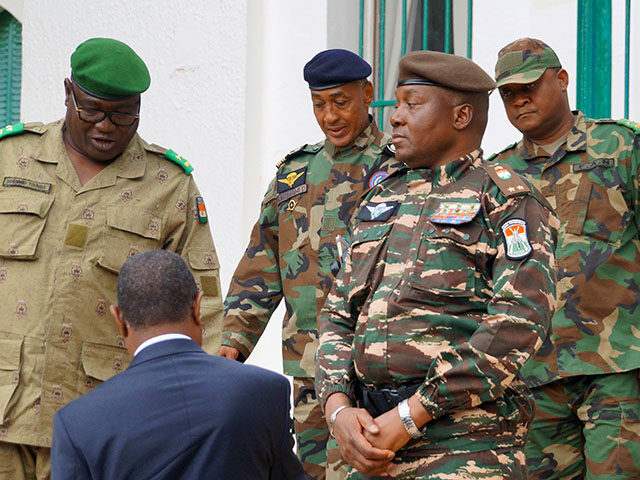General Abdourahmane Tchiani appeared on national television and declared himself the president of Niger on Friday, a day after a group of soldiers claiming to be the “National Council for the Safeguard of the Homeland” said they had overthrown President Mohamed Bazoum and suspended government operations.
Tchiani is the leader of Niger’s presidential guard. Prior to his broadcast on Friday, unconfirmed reports claimed that Tchiani was responsible for abducting Bazoum and placing him on house arrest to allow the military to take over the country.
Niger is a turbulent nation with a prolific recent history of coups d’etat in Saharan Africa. Bazoum, the country’s democratically elected leader since 2021, reportedly survived two coup attempts before this week. Neighbors Guinea, Burkina Faso, and Mali have all experienced similar military coups in the past two years.
His foreign policy brought the country closer to the United States and to former colonizer France, whose leadership enthusiastically rejected the coup on Friday and insisted it still recognized Bazoum as the nation’s leader. Bazoum spoke with American Secretary of State Antony Blinken on Thursday following the rebellion, receiving State Department support for his legitimacy.
Bazoum is believed to be trapped in the presidential palace; coup leaders have stated they have no intention of harming him in response to widespread outrage over the mutiny in western Africa. The Economic Community of West African States (ECOWAS), led by Nigeria, said in an outraged statement on Thursday it would “not tolerate” the overthrow of the government.
The public in Niger has reacted by organizing small rallies in favor and against the coup. Both the legitimate government and the military junta have urged civilians not to resort to violence. Tchiani claimed his group would enforce a curfew nationwide to keep the peace.
In his remarks to the public on Friday, Tchiani condemned Bazoum for acting with insufficient urgency against the many security threats Niger faces, particularly from jihadist groups.
“The current security approach has not made it possible to secure our country despite the heavy sacrifices made by Nigeriens and the appreciable and appreciated support of our external partners,” Tchiani said, an apparent nod to extensive American military aid. “We can no longer continue with the same approaches so far proposed at the risk of witnessing the gradual and inevitable disappearance of our country.”
Among the specific grievances Tchiani mentioned with Bazoum’s policies were the “extrajudicial release of several terrorist leaders without any guarantee in the context which is ours” and publicly lamenting that the terrorists were “stronger and more seasoned” than his own military. He also accused Bazoum of refusing “genuine collaboration” with Burkina Faso and Mali in fighting jihadist insurgencies, a sign that Tchiani may be interested in receiving the support of those neighboring coup governments.
The military dictatorships in both countries overtly rejected ongoing cooperation with France and America, turning instead to aid from Russia and its Wagner Private Military Company (PMC). No reports indicate any active Russian or Wagner involvement in the attempted overthrow of Bazoum at press time, but reports citing unnamed Western diplomats reveal some concern that the coup presents an opportunity for Moscow to expand its already formidable influence in the region at Washington’s expense.
Supporters of the coup in Niamey, the Nigerien capital, appeared eager for Russian support. Many took the streets waving Russian flags on Thursday and Friday.
“The action of the CNSP is motivated by the sole preoccupation of preserving our dear country, faced in part with the degradation of the security situation in our country and for which our authorities didn’t leave a real solution for a way out of the crisis, and the other part is for the bad economic and social governance,” Tchiani insisted, adding a public appeal “for serenity, calm, vigilance, and patriotism.”
Tchiani appeared to identify himself as an interim leader, but made no mention of elections or any other mechanism to install more permanent leadership.
The “National Council for the Safeguard of the Homeland” made its debut in a national broadcast on Thursday led by a spokesman identifying himself as Amadou Adramane, who listed similar complaints to Tchiani’s against Bazoum. Adramane announced that the military had shut the national borders and suspended the operations of all government agencies.
“This day, July 26, 2023, we the defense and security forces meeting within the National Council for the Safeguard of the Homeland have decided to put an end to the regime you know,” Adramane declared. “This follows the continuing deterioration of the security situation and poor economic and social governance.”
Adramane urged foreign actors not to intervene but offered assurances that any agreements made with Bazoum’s government remained in vigor.
Adding to the sense that Bazoum had fully lost power was a press release on Thursday from the Nigerien army that stated it would nott longer recognize him as president. The military statement said that recognizing the National Council was necessary to avoid “a deadly confrontation … that could create a bloodbath and affect the security of the population.” The military also insisted Bazoum would remain safe during the transition process.
On Friday, the coup junta issued announcements outlawing all political party activities and urging “the population to calm down and to refrain from any act of vandalism aimed at the destruction of public and private property.” It also announced the constitution had been suspended.

COMMENTS
Please let us know if you're having issues with commenting.